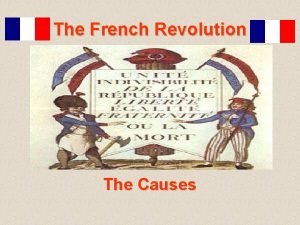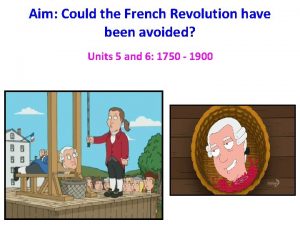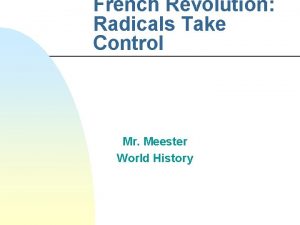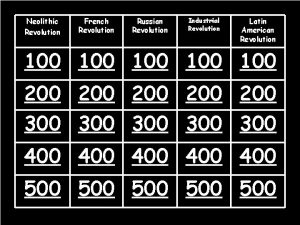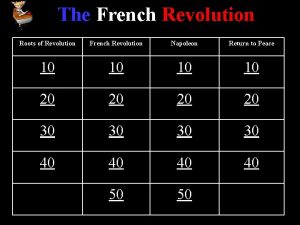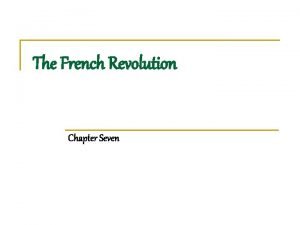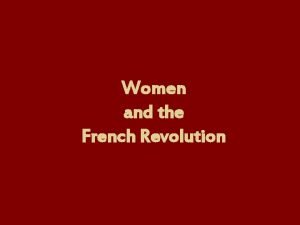The French Revolution Phases Periods of the French


















- Slides: 18

The French Revolution

Phases (Periods) of the French Revolution Louis XVI 1774 -1791 1)National Assembly (1789 -1791) 2)Legislative Assembly (1791 -1792) 3)Convention (1792 -1795 -Robespierre) 4)Directory (1795 -1799) Napoleon 1799 -1814/1815 Return to Monarchy

The French Revolution Unequal society transformed Collapse of Absolute Monarchy Enlightenment Principles take action Natural Rights First Constitution Decrease in Church Power

Long Term Causes of Revolution Absolute Monarchy Unjust Social Order Enlightenment Influence Economic Crisis

Powers of the Absolute Monarch Appointed the Intendants, the “petty tyrants” who governed France’s 30 districts Appointed the people who would collect his taxes and carry out his laws Controlled justice by appointing judges Controlled the military Could imprison anyone at any time for any reason (blank warrants of arrest were called lettres de cachet) Levied all taxes and decided how to spend the money Made all laws Made decisions regarding war and peace

King Louis XVI Ineffective Leader Seen as unsympathetic to French struggles Lavish lifestyle

The Three Estates Estate First Population • Circa 130, 000 • High-ranking clergy Second • Circa 110, 000 • Nobles Third • Circa 25, 000 • Everyone else: artisans, bourgeoisie, city workers, merchants, peasants, etc. , along with many parish priests Privileges Exemptions Burdens • Collected the tithe • Censorship of the press • Control of education • Kept records of births, deaths, marriages, etc. • Catholic faith held honored position of being the state religion (practiced by monarch and nobility) • Owned 20% of the land • Paid no taxes • Subject to Church law rather than civil law • Moral obligation (rather than legal obligation) to assist the poor and needy • Support the monarchy and Old Regime • Collected taxes in the form of feudal dues • Monopolized military and state appointments • Owned 20% of the land • Paid no taxes • Support the monarchy and Old Regime • None • Paid all taxes • Tithe (Church tax) • Octrot (tax on goods brought into cities) • Corvée (forced road work) • Capitation (poll tax) • Vingtiéme (income tax) • Gabelle (salt tax) • Taille (land tax) • Feudal dues for use of local manor’s winepress, oven, etc.

What do you see in this picture? How is it commenting on French society?

Financial Crisis Harvests & Extreme Poverty Huge Debt and Debt Spending American Revolution Unequal Society order and Taxation Economy on brink of bankruptcy Louis XVI calls Estates

The French Urban Poor

The Estates General Attempt to Tax the 2 nd Estate (Nobility) Third Estate has reform agenda Undemocratic voting procedure Voting by estate or by population? Third Estate declares itself the National Assembly

First Estate =1 Vote or 130, 000 Votes = e t ta r s E o d e 00 r t i o Th 1 V 00, 0 tes 5 2 Vo Se Es co tat nd 11 Vot e = 0, 0 e 1 o 00 r Vo tes

The Tennis Court Oath “The National Assembly, considering that it has been summoned to establish the constitution of the kingdom, to effect the regeneration of the public order, and to maintain the true principles of monarchy; that nothing can prevent it from continuing its deliberations in whatever place it may be forced to establish itself; and, finally, that wheresoever its members are assembled, there is the National Assembly; “Decrees that all members of this Assembly shall immediately take a solemn oath not to separate, and to reassemble wherever circumstances require, until the constitution of the kingdom is established and consolidated upon firm foundations; and that, the said oath taken, all members and each one of them individually shall ratify this steadfast resolution by signature. ”

Storming of the Bastille July 14, 1789 and Great Fear King Louis XVI gathers troops to combat National Assembly Crowd storm Bastille Prison for military supplies Iconic moment of French Revolution Louis XVI recognizes National Assembly Peasants uprisings throughout France End of Feudalism

Reforms of the National Assembly become ruling power in France Declaration of the Rights of Man New Constitution –restructures old order Limits nobility and church Provokes warfare from other European Powers

The Terror Louis XVI executed New National Convention radicalized under Jacobins Rise of Maximilien Robespierre “Terror is nothing other than justice, prompt, severe, inflexible” Reign of Terror Destroying Old French Society and Order Robespierre executed

Directory and Rise of Napoleon New Authority the Directory unable to restore order Elections fail - allowing General Napoleon to seize power- Emperor Napoleon Brought order to society Concordat of 1801 Napoleonic Civil Code Equality of law, Protection of Property

Napoleonic Wars Napoleon- Revolutionary general Won series of wars Fails to defeat British and Russians Napoleon defeated by collective European Powers in 1814. Monarchy Restored
 Tennis court oath definition ap world history
Tennis court oath definition ap world history Stages of the french revolution
Stages of the french revolution Immediate cause of french revolution
Immediate cause of french revolution How could the french revolution been avoided
How could the french revolution been avoided Russian revolution vs french revolution
Russian revolution vs french revolution Third agricultural revolution
Third agricultural revolution The tennis court oath
The tennis court oath Chapter 11 the french revolution and napoleon
Chapter 11 the french revolution and napoleon Liberty brotherhood equality
Liberty brotherhood equality ...
... How the french revolution could have been avoided
How the french revolution could have been avoided Chapter 11 the french revolution and napoleon
Chapter 11 the french revolution and napoleon French revolution
French revolution French revolution
French revolution French revolution incubation stage
French revolution incubation stage French revolution
French revolution French revolution
French revolution Economic causes of french revolution
Economic causes of french revolution Radicals take control french revolution
Radicals take control french revolution









